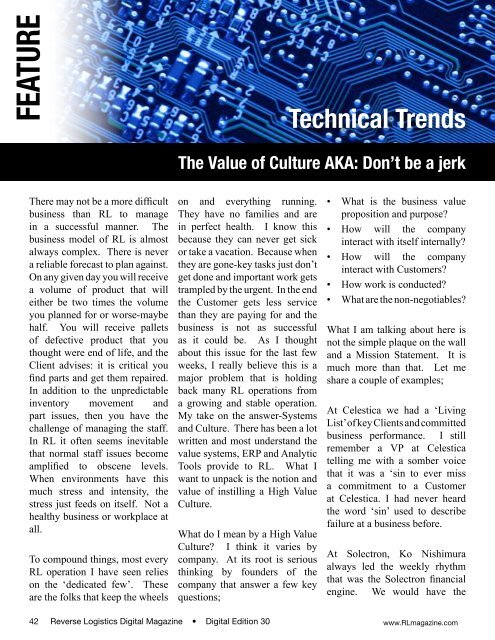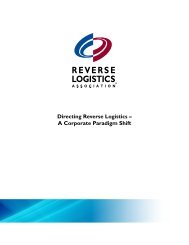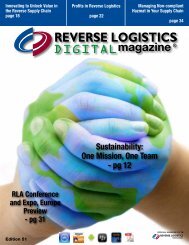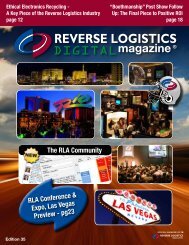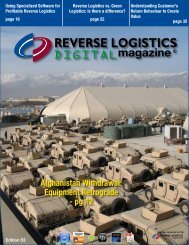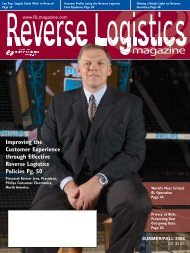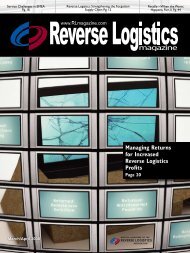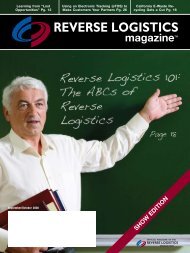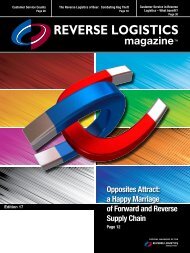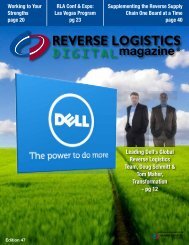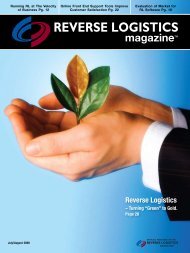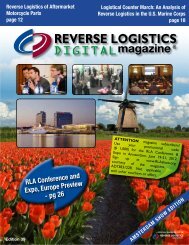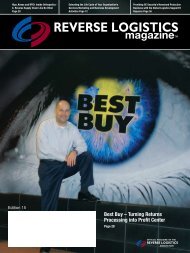Volvo Trucks' environmental affairs - page 12 - Reverse Logistics ...
Volvo Trucks' environmental affairs - page 12 - Reverse Logistics ...
Volvo Trucks' environmental affairs - page 12 - Reverse Logistics ...
You also want an ePaper? Increase the reach of your titles
YUMPU automatically turns print PDFs into web optimized ePapers that Google loves.
FEATURE<br />
There may not be a more difficult<br />
business than RL to manage<br />
in a successful manner. The<br />
business model of RL is almost<br />
always complex. There is never<br />
a reliable forecast to plan against.<br />
On any given day you will receive<br />
a volume of product that will<br />
either be two times the volume<br />
you planned for or worse-maybe<br />
half. You will receive pallets<br />
of defective product that you<br />
thought were end of life, and the<br />
Client advises: it is critical you<br />
find parts and get them repaired.<br />
In addition to the unpredictable<br />
inventory movement and<br />
part issues, then you have the<br />
challenge of managing the staff.<br />
In RL it often seems inevitable<br />
that normal staff issues become<br />
amplified to obscene levels.<br />
When environments have this<br />
much stress and intensity, the<br />
stress just feeds on itself. Not a<br />
healthy business or workplace at<br />
all.<br />
To compound things, most every<br />
RL operation I have seen relies<br />
on the ‘dedicated few’. These<br />
are the folks that keep the wheels<br />
on and everything running.<br />
They have no families and are<br />
in perfect health. I know this<br />
because they can never get sick<br />
or take a vacation. Because when<br />
they are gone-key tasks just don’t<br />
get done and important work gets<br />
trampled by the urgent. In the end<br />
the Customer gets less service<br />
than they are paying for and the<br />
business is not as successful<br />
as it could be. As I thought<br />
about this issue for the last few<br />
weeks, I really believe this is a<br />
major problem that is holding<br />
back many RL operations from<br />
a growing and stable operation.<br />
My take on the answer-Systems<br />
and Culture. There has been a lot<br />
written and most understand the<br />
value systems, ERP and Analytic<br />
Tools provide to RL. What I<br />
want to unpack is the notion and<br />
value of instilling a High Value<br />
Culture.<br />
What do I mean by a High Value<br />
Culture? I think it varies by<br />
company. At its root is serious<br />
thinking by founders of the<br />
company that answer a few key<br />
questions;<br />
Technical Trends<br />
The Value of Culture AKA: Don’t be a jerk<br />
• What is the business value<br />
proposition and purpose?<br />
• How will the company<br />
interact with itself internally?<br />
• How will the company<br />
interact with Customers?<br />
• How work is conducted?<br />
• What are the non-negotiables?<br />
What I am talking about here is<br />
not the simple plaque on the wall<br />
and a Mission Statement. It is<br />
much more than that. Let me<br />
share a couple of examples;<br />
At Celestica we had a ‘Living<br />
List’ of key Clients and committed<br />
business performance. I still<br />
remember a VP at Celestica<br />
telling me with a somber voice<br />
that it was a ‘sin to ever miss<br />
a commitment to a Customer<br />
at Celestica. I had never heard<br />
the word ‘sin’ used to describe<br />
failure at a business before.<br />
At Solectron, Ko Nishimura<br />
always led the weekly rhythm<br />
that was the Solectron financial<br />
engine. We would have the<br />
“Hard-Call” on Thursday where<br />
the GM’s would freeze the<br />
revenue forecast for the next<br />
month and then we would have<br />
weekly reviews of our RnO (risks<br />
and opportunities). Solectron<br />
was also a pioneer in the CFT<br />
(Customer Focused Teams) that<br />
everyone seems to have a version<br />
of today. I still have a copy of the<br />
Solectron CFT training manual;<br />
it is almost like a great piece of<br />
literature to read.<br />
The practices at these companies<br />
made an impact on me that still<br />
echoes today. In short the culture<br />
helped assure I was obligated<br />
to keep the team successful.<br />
This is very similar to what the<br />
military does with their boot<br />
camp training-instill the value of<br />
the team and the responsibility<br />
to cover for each other. When<br />
someone hires in at companies<br />
with a focus on maintaining their<br />
cultural identify the process is<br />
pretty standard. You are ‘onboarded’<br />
with indoctrination<br />
training to make you aware of all<br />
the history and the responsibility<br />
of your conduct. In addition there<br />
will be some type of training on<br />
ethical conduct and finance. The<br />
issue with ethics is one that I<br />
believe also needs serious focus,<br />
especially in RL. There will<br />
always be opportunities for ethical<br />
issues and conflicts in the RL<br />
business. Having stated upfront<br />
the company commitments to<br />
ethics and non-negotiables is a<br />
powerful way to address with<br />
Clients and Staff your pledge to<br />
do the right things. How many<br />
RL Businesses have you seen<br />
with these kinds of training<br />
today? Not many-most believe<br />
this type of training has little<br />
value and will cost too much. Not<br />
me, the real cost is in addressing<br />
failure to your Customers.<br />
Imagine the value and power of<br />
developing a sustaining culture<br />
in your business as you try to win<br />
new business.<br />
There are many companies that<br />
have begun to see the value of<br />
integrating a Sustaining Culture,<br />
Ethics and Values and are doing<br />
so in a public way to promote<br />
their overall success. So let me<br />
point you to some leaders of<br />
this kind of content to get your<br />
creative juices flowing.<br />
My personal favorite for getting<br />
your attention is Success Factors.<br />
They have a set of directives<br />
and guidance called ‘Rules of<br />
Engagement’. These rules are<br />
summed up in their opening<br />
training slide with the statement<br />
that I cannot really state here,<br />
except to say-don’t be a jerk.<br />
http://www.slideshare.net/<br />
successfactors/successfactorscore-values<br />
Then there is Google. On the<br />
Corporate side, they build their<br />
code around the “Don’t be<br />
evil.” mandate. This is further<br />
expanded into a really well done<br />
primer on corporate ethics. http://<br />
investor.google.com/corporate/<br />
code-of-conduct.html<br />
For the Google Employee Team,<br />
the workplace culture is outlined<br />
with ‘Ten things we know to be<br />
true’ Then with the few links on<br />
the left you can discover their<br />
commitment to security, style<br />
and design. http://www.google.<br />
com/about/corporate/company/<br />
tenthings.html<br />
However, the one MUST READ,<br />
document for defining workplace<br />
culture is from a hedge fund of all<br />
places. Ray Dalio is the amazing<br />
leader of the famous hedge fund<br />
Bridgewater. He has worked to<br />
carefully quantify the culture he<br />
wants at Bridgewater with an<br />
80 <strong>page</strong> book he authored called<br />
‘Principles’. This is simply a<br />
tremendous read that WILL<br />
cause you to think. You may not<br />
like all that he says. But you will<br />
like a lot of it-and you will think<br />
for days later.<br />
http://cache.dealbreaker.com/<br />
uploads/2010/05/Bridgewater-<br />
A s s o c i a t e s - R a y - D a l i o -<br />
Principles.pdf<br />
There really is a way to break<br />
the cycle of drama, heroics and<br />
firefighting. It starts with a<br />
defined culture that is based on<br />
ethical conduct. Being successful<br />
in this area will make work more<br />
enjoyable, scalable and attractive<br />
to Clients.<br />
RLM<br />
L. Bryant<br />
U n d e r w o o d<br />
is Director,<br />
Supply Chain for<br />
Elbit Systems<br />
of America, a<br />
leading provider<br />
of high performance products<br />
and system solutions focusing on<br />
the defense, homeland security,<br />
commercial aviation and medical<br />
instrumentation markets.<br />
42 <strong>Reverse</strong> <strong>Logistics</strong> Digital Magazine • Digital Edition 30 www.RLmagazine.com Digital Edition 30 • <strong>Reverse</strong> <strong>Logistics</strong> Magazine 43<br />
www.RLmagazine.com


